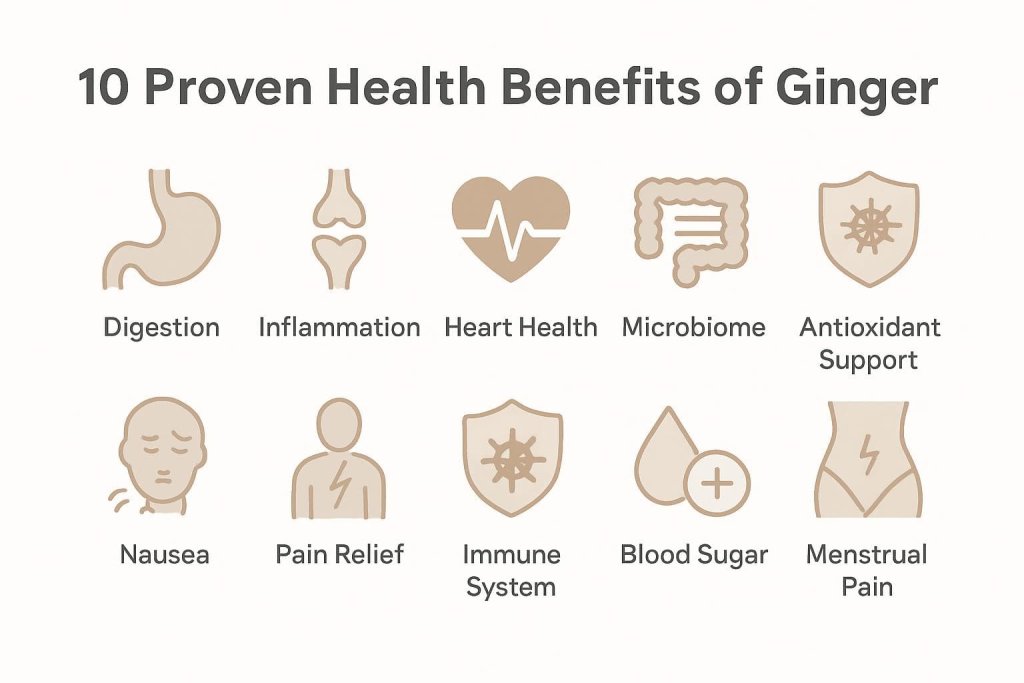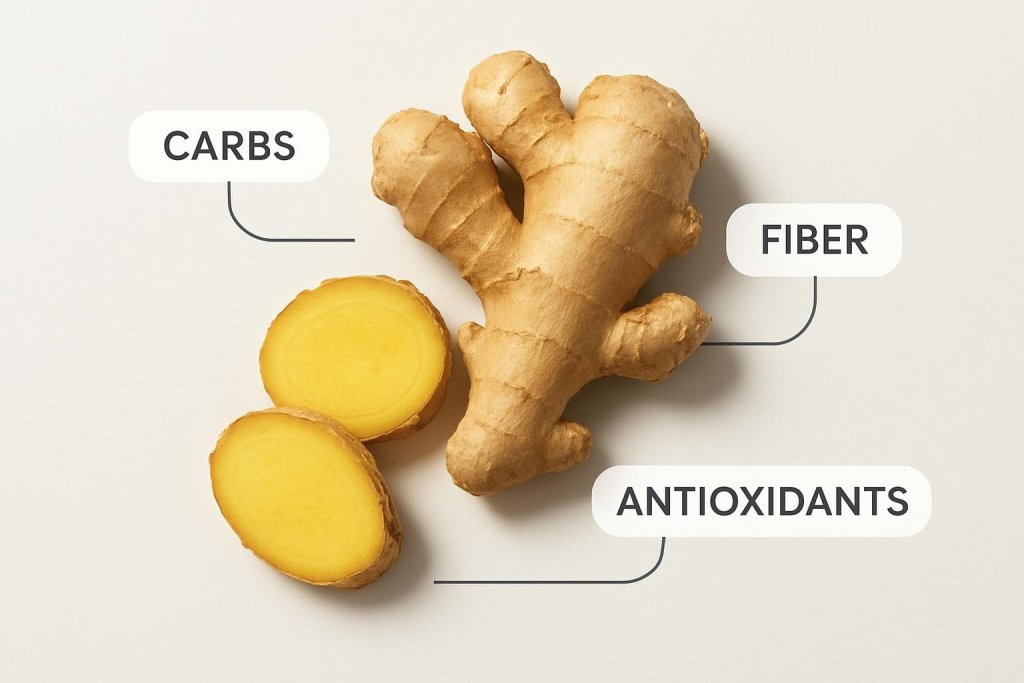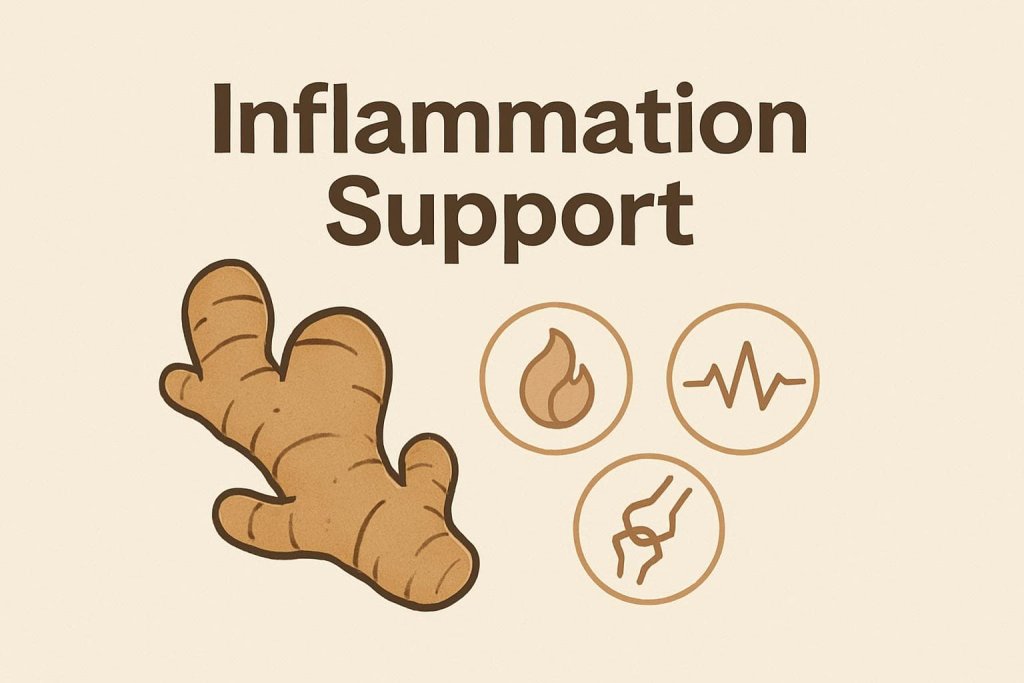Ginger may help support digestion, comfort, and overall wellness due to its natural antioxidants and bioactive compounds. This makes it one of the most widely used functional foods worldwide. Ginger is rich in natural compounds such as gingerols and shogaols, which have been studied for their potential digestive, metabolic, and antioxidant effects.

Understanding the health benefits of ginger helps you use it safely and effectively. Research highlights its role in digestion, nausea support, blood sugar balance, joint comfort, and general health. Below, you’ll find a complete, evidence-backed guide on what ginger can do for your body, how to use it, and who should be cautious.
What Is Ginger? (Overview and Nutrition Profile)

Ginger (Zingiber officinale) is a flowering plant widely used as a spice and wellness ingredient. It comes from the rhizome of the ginger plant and has been valued for centuries in cooking and traditional health practices. Today, ginger is recognized for its rich content of natural compounds—especially gingerols, shogaols, and zingerone—which are linked to its potential digestive, antioxidant, and anti-inflammatory effects.
According to the National Center for Complementary and Integrative Health (NCCIH), ginger is commonly used to support digestion, nausea comfort, and overall wellness, especially in culinary forms such as teas, stir-fries, soups, and smoothies.
Fresh, dried, powdered, and supplemental forms of ginger are widely available, but most people benefit safely from food-level amounts, which offer plant compounds without the potency of concentrated extracts.
Nutrition Profile of Fresh Ginger (per 100 g)
(Source: USDA FoodData Central)
- Calories: 80
- Carbohydrates: 17.8 g
- Fiber: 2 g
- Protein: 1.8 g
- Fat: 0.8 g
- Potassium: 415 mg
- Vitamin C: 5 mg
- Key compounds: gingerols, shogaols, paradols, zingerone
While ginger is typically consumed in small amounts, its concentrated phytochemicals may support digestion, comfort, and general wellness when used regularly as part of a balanced diet. Fresh ginger also provides small amounts of vitamins, minerals, and antioxidants that contribute to its beneficial profile.
Ginger’s strong flavor, versatility, and natural plant compounds make it a valuable addition to everyday meals, teas, and beverages for those seeking simple, food-based wellness support.
10 Proven Health Benefits of Ginger Backed by Research
Ginger contains bioactive compounds, including gingerols and shogaols, that have been widely studied for their potential effects on digestion, inflammation, metabolism, and general wellness. The following science-backed benefits highlight what ginger may offer when used safely as part of a balanced diet.
1. May Help Reduce Nausea and Morning Sickness

Clinical research shows ginger may help reduce mild nausea related to pregnancy, motion sickness, and post-surgery recovery. The National Center for Complementary and Integrative Health (NCCIH) notes that ginger supplements in doses around 1 gram per day have been studied for nausea relief, especially in early pregnancy, though results vary and safety should be discussed with a clinician.
Ginger capsules, ginger tea, or grated fresh ginger are commonly used forms in studies. Because pregnancy is a sensitive medical condition, anyone expecting should consult a healthcare provider before using ginger supplements.
2. Supports Healthy Digestion

Ginger may support smooth digestion by helping food move more efficiently from the stomach into the small intestine, a process known as gastric emptying. According to Johns Hopkins Medicine, ginger may help reduce occasional indigestion, bloating, and discomfort caused by slow stomach motility.
Many people use warm ginger tea, minced ginger in meals, or ginger-infused water to support digestive comfort. This gentle effect makes ginger a popular choice for easing everyday gastrointestinal discomfort.
3. May Support Blood Sugar Balance

Research suggests ginger may support healthy fasting blood sugar and HbA1c levels, especially in individuals managing metabolic concerns. A review published in nutrition and diabetes journals shows that ginger supplementation may support normal insulin sensitivity when used alongside standard medical care.
For safe guidance on blood sugar and diet, refer to the American Diabetes Association.
Ginger should never replace prescribed medication, but it may complement a balanced diet and active lifestyle under professional supervision.
4. Contains Powerful Antioxidants

Ginger is rich in antioxidants, which may help the body defend itself against everyday oxidative stress. According to the U.S. Department of Agriculture (USDA) FoodData Central, ginger contains plant compounds like gingerols and shogaols that contribute to its natural antioxidant capacity.
USDA link: https://fdc.nal.usda.gov/
These antioxidants support long-term wellness by helping reduce the impact of free radicals generated by stress, diet, and environmental exposure.
5. May Support Immune and Respiratory Comfort

Ginger tea is commonly used to support throat comfort and ease seasonal wellness concerns. While ginger does not replace medical treatment, compounds in ginger may support the body’s natural immune response.
Harvard T.H. Chan School of Public Health notes that ginger’s plant compounds contribute to its traditional use for wellness and respiratory comfort.
Warm ginger drinks may help soothe the throat and support overall comfort during seasonal changes.
6. May Help Ease Mild Muscle or Menstrual Discomfort

Some studies show ginger may help reduce mild muscle soreness after exercise and ease occasional menstrual discomfort. This is linked to ginger’s natural anti-inflammatory properties, which may help support the body’s response to everyday physical strain.
For research-backed dietary guidance, see NIH Office of Dietary Supplements:
https://ods.od.nih.gov/
Ginger tea, grated ginger in warm water, or small culinary amounts of powdered ginger are common ways people use ginger for gentle wellness support.
7. May Support Heart Health

Ginger’s antioxidant and anti-inflammatory compounds may support overall heart health. Research suggests ginger may help maintain healthy LDL cholesterol and triglyceride levels when combined with an active lifestyle and heart-healthy diet.
For heart health guidance, visit the American Heart Association (AHA).
While ginger alone will not manage heart conditions, incorporating it into meals may support cardiovascular wellness as part of broader lifestyle choices.
8. Supports Healthy Inflammation Levels

Ginger may help support the body’s natural inflammatory response due to its active compounds—especially gingerols—which are known for their antioxidant and anti-inflammatory properties. These plant compounds may help the body manage everyday inflammation related to diet, stress, or physical activity.
The Cleveland Clinic notes that ginger is widely recognized for its potential to support inflammation management and general comfort, especially when used consistently in food-level amounts.
Research also shows that ginger’s antioxidants may help reduce certain markers of inflammation in the body, which supports overall wellness when combined with a balanced lifestyle. Regular, moderate use of ginger—such as in teas, meals, or smoothies—may contribute to long-term inflammatory balance.
9. May Promote Joint Comfort

Some clinical trials suggest ginger extract may help support joint mobility and reduce everyday stiffness, especially in older adults. Effects vary across studies, but consistent use appears to play a role in perceived comfort.
For evidence-based joint health guidance, visit Arthritis Foundation.
Food-level ginger may be used long-term, while supplements should only be taken under medical supervision due to medication interactions.
10. May Support Gut Microbiome Balance
Emerging research suggests ginger may help support a healthy gut microbiome by influencing digestive enzymes and promoting favorable bacterial activity. A small human study found that daily ginger intake (around 1.2 g of ginger root powder for 14 days) led to measurable shifts in gut bacterial composition, indicating its potential role in microbial balance.
Harvard Health Publishing explains that diet plays a central role in shaping the microbiome and that a diverse, well-supported gut environment contributes to digestion, immune function, and overall wellness.
While more large-scale studies are needed, incorporating ginger into meals, teas, smoothies, or broths may help support digestive balance as part of an overall gut-friendly diet rich in whole foods and fiber.
Possible Side Effects and Precautions
Ginger is generally safe for most adults when used in typical food amounts. However, because ginger contains concentrated bioactive compounds, higher doses—especially from supplements—may cause unwanted effects in some individuals. The National Center for Complementary and Integrative Health (NCCIH) notes that ginger is safe for most people but may cause digestive issues at higher amounts or interact with certain medications.
1. Digestive Issues at High Doses
Large amounts of ginger may cause:
- Heartburn or acid reflux
- Gas or bloating
- Stomach discomfort
- Loose stools
These effects are more common when consuming strong ginger extracts or several grams per day.
2. GERD and Acid Reflux
Because ginger can stimulate digestion, individuals with GERD or frequent acid reflux may experience increased discomfort with higher doses. Food-level amounts are typically tolerated better than supplements.
3. Gallstones or Gallbladder Concerns
Ginger may stimulate bile production, which can be problematic for people with gallstones. Those diagnosed with gallbladder conditions should consult a healthcare professional before using supplements.
4. Medication Interactions
Ginger may interact with certain medications, especially at supplemental doses:
- Blood thinners (e.g., warfarin, aspirin): Ginger may increase bleeding risk.
- Diabetes medications: Ginger may support lower blood sugar, which could enhance medication effects.
- Blood pressure medications: Ginger may influence circulation and could interact with certain prescriptions.
For safe medication guidance, refer to MedlinePlus (U.S. National Library of Medicine)
5. Pregnancy and Breastfeeding
Some studies show ginger may help reduce mild pregnancy-related nausea. However, experts recommend not exceeding 1 gram per day and avoiding supplemental forms without medical approval. Pregnant individuals should consult their clinician before using ginger supplements.
6. Supplement Safety Guidance
If choosing ginger supplements:
- Select products tested by USP, NSF, or ConsumerLab
- Avoid blends with unspecified “proprietary formulas”
- Check for standardized gingerol content
- Avoid excessive doses above 2–3 g/day unless directed by a clinician
How to Choose High-Quality Ginger
Selecting high-quality ginger ensures you receive the most flavor, nutrients, and beneficial plant compounds. Using a mix of fresh, dried, and powdered ginger can support overall wellness when sourced carefully.
1. Fresh Ginger
- Choose ginger with smooth, firm skin and a strong aroma.
- Avoid roots that look wrinkled, moldy, or excessively dry.
- Young ginger has milder flavor; mature ginger has stronger gingerol content.
2. Dried or Powdered Ginger
- Look for labels that state 100% ginger.
- Avoid powders with added sugars, anti-caking agents, dyes, or flavor enhancers.
- Store in an airtight container away from heat and moisture.
3. Organic vs. Conventional
Organic ginger may reduce exposure to agricultural chemicals, but both forms can be nutritious. Wash fresh ginger thoroughly before use.
4. Ginger Teas and Beverages
- Choose unsweetened varieties.
- Avoid teas with added syrups, artificial flavors, or excessive sugar.
- Check that ginger is listed as the primary ingredient.
5. Supplements and Extracts
When selecting ginger supplements:
- Choose brands with USP, NSF, or ConsumerLab certification
- Check for standardized extract amounts (e.g., percent gingerols)
- Follow dosage guidance and consult your healthcare provider
For supplement quality standards, see USP Dietary Supplement Verification Program.
How to Add Ginger Safely to Your Diet
Ginger is versatile and can be added to many foods and beverages. Using it regularly in culinary amounts is generally safe and may support digestion, comfort, and overall wellness.
Daily Intake Guidelines
- General adult intake: 1–3 grams per day from food, tea, or powdered ginger
- Avoid exceeding 4 grams/day unless medically supervised
- Pregnancy: Limit to 1 gram/day only with clinician approval
Safe and Popular Ways to Use Ginger
- Teas: Steep freshly sliced ginger in hot water
- Smoothies: Add small pieces of fresh ginger for flavor and digestive support
- Cooking: Use grated or minced ginger in soups, stir-fries, marinades, and curries
- Baking: Add powdered ginger to oatmeal, granola, muffins, or cookies
- Infused water: Add thin slices of ginger to warm water or lemon water
Special Population Considerations
- Individuals with GERD may tolerate smaller amounts better
- People on medications (blood thinners, diabetes drugs) should consult a clinician
- Children should only consume small culinary amounts
- Avoid high-dose supplements unless directed by a healthcare professional
FAQs About Ginger and Health
1. How much ginger can I safely consume daily?
Most adults can safely consume up to 3–4 grams per day from food. Supplements should be taken with medical guidance.
2. Is ginger safe for pregnancy?
Small amounts of food-level ginger are generally safe, but supplements should only be used with a healthcare provider’s approval. Do not exceed 1 gram/day.
3. Can ginger support digestion?
Yes. Ginger may support comfortable digestion and help reduce occasional bloating, gas, or nausea when consumed in food or tea.
4. Does ginger help with inflammation?
Ginger contains antioxidant compounds, such as gingerols, that may support healthy inflammation levels. It does not replace medical treatment.
5. Can ginger interact with medications?
Yes. Ginger may interact with blood thinners, diabetes medications, and some blood pressure drugs. Always speak with a healthcare professional before using supplements.
6. Is ginger tea better than fresh ginger?
Both can be beneficial. Fresh ginger provides stronger natural compounds, while ginger tea is gentle and easy to digest.
7. Can children consume ginger?
Small amounts in food are generally safe. Avoid supplements for children unless directed by a pediatrician.
Conclusion
Ginger is a versatile food that may support digestion, comfort, antioxidant protection, and overall wellness when used in safe, culinary amounts. Choosing high-quality ginger and following appropriate intake guidelines ensures you enjoy its natural benefits while minimizing risks. Always consult a healthcare provider if you have medical conditions, take medications, or plan to use ginger supplements.
This content is for informational purposes only and not medical advice.
References:
- National Center for Complementary and Integrative Health (NCCIH) – Ginger
https://www.nccih.nih.gov/health/ginger - Johns Hopkins Medicine – Health Benefits of Ginger
https://www.hopkinsmedicine.org/health/wellness-and-prevention/ginger-benefits - Harvard Health Publishing – Health Benefits of Ginger and Simple Ways to Use It
https://www.health.harvard.edu/staying-healthy/health-benefits-of-ginger-and-simple-ways-to-incorporate-this-zesty-root-into-your-diet - Cleveland Clinic – Ginger Health Benefits
https://health.clevelandclinic.org/ginger-health-benefits
